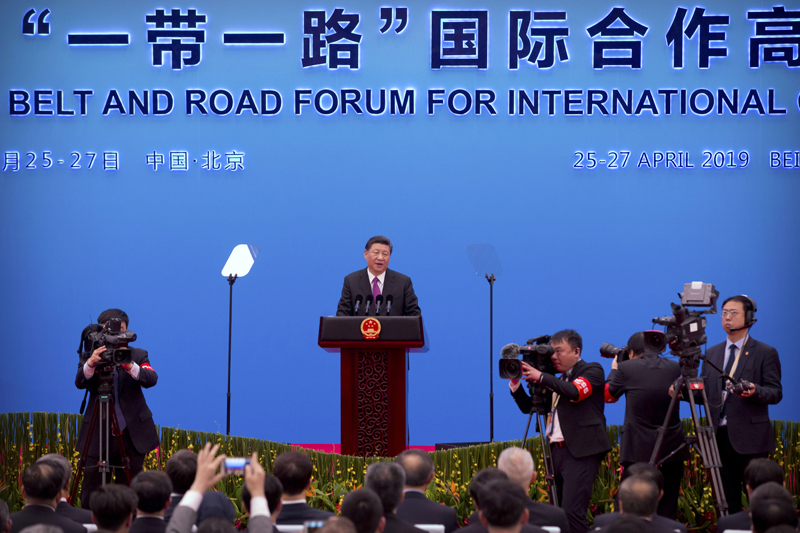Why the West is so worried by China’s Belt and Road

German Chancellor Angela Merkel and French President Emmanuel Macron will meet Southeast European leaders on Monday. While they will discuss the conflict between Serbia and Kosovo, also on the agenda at the summit is the concern in Brussels, Berlin and Paris about China’s increasing influence in the Balkans.
The situation in Southeast Europe is just a microcosm of wider Western worries about the impact of China’s multitrillion-dollar Belt and Road Initiative (BRI), which now has the backing of more than 100 countries and international organizations. This project, some say the biggest logistical development in history, was also the focus of a summit in Beijing on Friday and Saturday last week of representatives of about 40 governments.
They included not only increasingly important allies of China such as Russian President Vladimir Putin (fresh from his meeting with Kim Jong Un) and Pakistan’s Prime Minister Imran Khan, but also Giuseppe Conte, the prime minister of Italy, recently the first G7 country to sign on to the BRI in a move that generated alarm not only in Europe but also the United States.
It is no coincidence that the delegates sent to Beijing by those states most skeptical about the initiative were below the rank of national leader. This included the US, which sent a significantly lower-level delegation.
The summit highlighted the progress to date in the project: It was announced, for instance, that Chinese companies have already invested $90 billion in nations that have signed up to the BRI, with a further $200-300 billion of loans agreed. Beijing also sought to tackle, upfront, concerns about so-called Chinese “debt diplomacy” by pledging to respect global debt goals and promote green growth.
While Beijing’s economic rationale for the BRI is obvious, the political angle is key too, as Western critics are only too aware. Take the example of Africa: Its growing importance is illustrated by the fact that its population is forecast to double to 2.2 billion by 2050, and 60 percent will be under the age of 25.
The continent, an increasingly key focus for China, already has six of the world’s 12 fastest-growing countries: Ethiopia, the Democratic Republic of the Congo, Cote d'Ivoire, Mozambique, Tanzania and Rwanda. The IMF also predicts that by 2023 Africa’s growth prospects will be among the best in the world.
Small wonder, therefore, that Beijing is utilizing the BRI to leverage its political influence there, buttressed by frequent trips from top leadership. The Chinese president, premier and foreign minister have made in excess of 80 visits to more than 40 African nations over the past decade alone. Donald Trump, meanwhile, might not visit the continent at all during his first four-year term in the White House, perhaps reflecting his reported derogatory references last year to the countries there.
Africa has six of the world’s 12 fastest-growing countries and China is utilizing its Belt and Road Initiative to leverage its political influence there
Andrew Hammond
A good case study is Kenya, which has a population of about 50 million and is a key US partner in the region, including the campaign against terrorism. Yet its external debt is now largely (around 70 percent) owed to Beijing, and many large infrastructure projects are being built by Chinese firms.
Given Trump’s lack of any focus on Africa, much of the impetus behind current US policy toward the continent is coming from Congress rather than the administration. Last autumn, for instance, legislators passed, on a bipartisan basis, legislation to create a $60 billion agency to oversee strategic investment in developing countries, including those in Africa.
The proposed International Development Finance Corporation is a clear part of Washington’s response to China’s growing influence, and marks a return to US-aid policy with commercial diplomacy and geopolitics center stage. The IDFC, which has been endorsed by Trump, will become the preeminent US government development-finance institution for progressing US interests in multiple ways, including the enhancement of US geopolitical influence with regard to China.
Yet during the Trump years China still looks like securing an edge in Africa at the expense of the US. The financial clout and political resolve of Beijing in its dealing with the continent are also overshadowing other key Western nations such as France, Germany and the United Kingdom, which are also showing greater interest.
Under Macron, for instance, Paris is seeking to increase its ties with former colonies while reinforcing relations with the continent’s biggest economies, including South Africa and Nigeria. Merkel has also made numerous trips to the continent.
Meanwhile embattled British Prime Minister Theresa May made her first, and probably last, prime ministerial visit to Africa last year to meet the heads of three major Commonwealth countries: South Africa, Nigeria, and Kenya. The continent has assumed a new importance to the UK as a result of Brexit, as London seeks to consolidate ties with key non-EU nations.
However, with the possible exception of the US, especially under a future president more committed to Africa, this upsurge of attention paid to the continent by Western governments risks being dwarfed by the focus of Beijing. This is why the BRI will continue to worry the West, in its dealings with Africa and beyond, as Beijing consolidates its global political and economic influence.
• Andrew Hammond is an Associate at LSE IDEAS at the London School of Economics









































